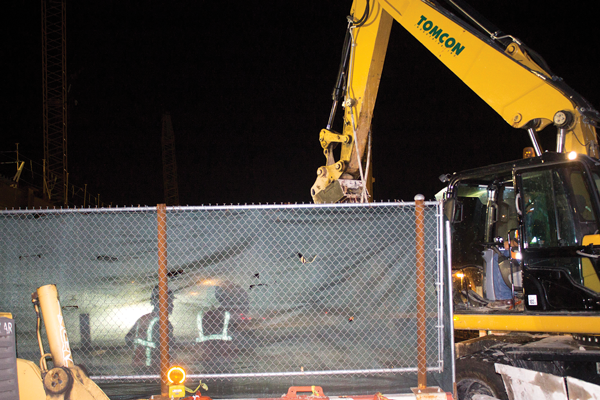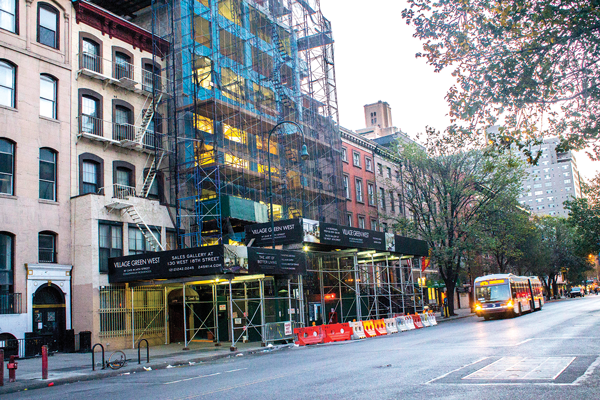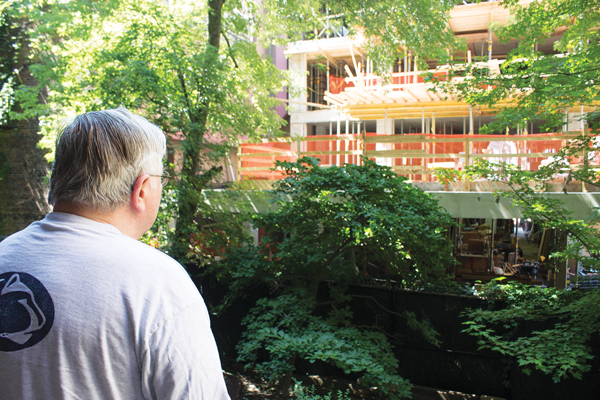
Manhattan Borough President Gale Brewer says After-Hours construction complaints regularly come to her office from frustrated CB4 constituents. One man claimed that ongoing work at Hudson Yards was drumming him out of the neighborhood.
BY ZACH WILLIAMS | With a few clicks of a mouse, taps of the keyboard and a little paperwork, local real estate developers can secure and renew After-Hours Variances (AHVs) from the city Department of Buildings (DOB). Residents who lodge complaints via 311 aren’t so lucky. Few permits are ever revoked.
A bill before the City Council would establish new limits on AHVs, but a hearing date before the council’s Committee on Housing and Buildings has yet to be scheduled.
AHVs are issued when public safety concerns supposedly preclude construction or renovation work during the normal weekday hours of 7 a.m. until 6 p.m. Schools and hospitals can utilize them in order to lessen risk to students and patients. However, for many projects, the public safety reason given on applications is traffic congestion. Listed work could be anything from moving a construction crane down a busy thoroughfare to painting a future luxury apartment building.
“The public wasn’t told that this is happening,” said Stanley Bulbach, president of the West 15th Street 100 and 200 Block Association. “All we know is that we have noise twenty-four-seven.”
Within the boundaries of Community Board Four (CB4), DOB records indicate that 1,975 AHVs have been issued in 2014 — 8.7 percent of the Manhattan total of 22,931. Eleven permits were later revoked within CB4, according to the records obtained on Oct. 9. The data was consistent with the volume of AHVs issued in 2013, according to the DOB.
AHVs impact residents in a variety of ways. Chelsea Now reported on July 17 that a local musician could not record at home. Elsewhere, a backyard garden went under-utilized this past summer. These are First World problems, they concede — but nonetheless, residents complain that late night and early morning work prevents them from getting adequate shut-eye.
Despite repeated calls via 311, the sources of their frustration, developers, face no public scrutiny when they apply for AHV renewals. One project on W. 14 St., for example, has received 30 AHVs in 2014 alone. The permits are given on a case-by-case basis, according to the DOB.
“What my office is seeing is far too many after hour work permits being rubber stamped by the Department of Buildings,” Councilmember Corey Johnson said in an email. “This is creating a nightmare situation for anyone who lives near a construction site that has a permit to work after hours.”
He added that constituents throughout his district have turned to his office in recent months.

“My office has worked with the Department of Buildings to notify them of problematic development sites, and about developers who are not in compliance with their permits. I hear about this from the Village up to Hell’s Kitchen, so it’s something I take very seriously,” he said in the email.
Local elected officials say that a legislative remedy, which is now before the City Council, will take time — though they expressed optimism that it would eventually pass. Representatives of the real estate industry told Chelsea Now that they are willing to cooperate with the council on the issue. However, the bill remains in committee with no official action taken since February, according to the council’s website.
It has garnered 10 co-sponsors, including Johnson, in addition to Rosie Mendez and Daniel Garodnick (who are the primary sponsors of the bill).
A similar bill did not make it out of committee last year, though that was not because of political or “nefarious” reasons, according to Manhattan Borough President Gale Brewer. She sponsored that bill but as election time neared, priorities for other outgoing councilmembers were elsewhere, said Brewer who at that time represented the Upper West Side in the council.
She added that she will co-sponsor this year’s effort. Patience is a virtue when it comes to passing a bill, she said.
“Legislation doesn’t just pop up,” she quipped.
In an interview with Chelsea Now, Mendez said that the bill is undergoing revisions, though she did not name specifics. Organized labor expressed concerns that limiting AHVs would affect members’ work opportunities, she said. School and hospital officials were worried that they would have to conduct renovation work while students or patients were present. She has yet to meet with representatives from the real estate industry nor the mayor regarding this issue, Mendez added, noting that city government is “failing” residents by issuing so many AHVs. They seemingly have no relief from the hustle and bustle of the city that never sleeps, according to critics of the current AHV regulatory regime.
“It’s unacceptable for someone to have four to six hours of no noise, and all the other time there is construction going,” she said. “I’ve had people call my office irate. It’s clear how it’s taking a toll on them, that they’re about to have a breakdown.”
In its current form as stated on the council’s website, the bill would change the city administration code to limit AHVs to between 7 a.m. and 8 p.m., Monday through Friday. Saturday construction would only be permitted between 11 a.m. and 4 p.m. with no work allowed on Sundays.
There would also be increased notification for nearby residents, according to the bill. The hours permitted by a variance would have to be posted on the construction site. Email notifications would alert residents to approved variances within their community board district. In addition, the developer and the DOB would have to publicly release a written rationale for respectively applying for and approving an AHV.
Officials from the Real Estate Board of New York (REBNY) said the proposed restrictions are too broad. Furthermore, relatively quiet construction such as painting or plumbing work for example should be allowed because such activities don’t make a lot of noise, the REBNY officials said.
A representative indicated in a statement that REBNY was interested in talking.
“To the extent that we can isolate and address the issues that the bill is trying to solve, REBNY and our members are always willing to discuss improvements between construction and its surrounding community,” Senior Vice President Angela Pinsky wrote.
“The ability to have flexibility in construction is paramount to our city’s economy,” she added.
Mendez said in the interview that the bill aims to reassert a balance between the economic needs of the city and the wishes of its citizens for appropriate lengths of quiet time.
“We’re not trying to stop construction and we’re not trying to stop construction at night when they clearly can’t do it during the day,” she said. “What we’re trying to stop is construction day and night.”
Whether the bill passes or not, AHV critics say, something must be done to ensure that people living in Chelsea know when to expect such racket. According to Bill Borock, president of the Council of Chelsea Block Associations (which represents 16 such groups), increased communication is key.
He said his recent experience with film shoots in the neighborhood is an example of how a city agency and private interests can reach out to residents through the community boards. “If it can work for the Mayor’s Office of Film, Theatre and Broadcasting, why not the DOB?” asked Borock.
The department might just turn opponents into friends, Borock suggested, if local block association members could only become “the eyes and ears for the DOB in terms of what is happening on the block.”
With former Mayor Michael Bloomberg — whose encouragement of real estate development many people blame for the proliferation of AHVs in recent years — the time appears ripe to activists and elected officials alike to set a new pitch on muting noise issues.
Direct negotiations with developers helped resolve an AHV situation on Amsterdam Ave. in the West 60s on the Upper West Side, said Brewer. But they need to demonstrate to community boards and residents better reasoning than that which evidently passes DOB scrutiny, she said.
“We had always thought that to get a weekend permit there were extenuating circumstances,” she said.
Brewer added that complaints regularly come to her office from frustrated CB4 constituents. One man recently claimed that ongoing work at Hudson Yards was drumming him out of the neighborhood, she said.
Workers were busy there on the night of Oct. 15. Heavy machinery moved about with bright lights blazing onto the sprawling construction site. Around the corner on W. 14th St. workers loudly banged away working on the street.
It was just another night among many when Chelsea continues its ongoing transformation into one of the city’s ritziest areas. Bulbach said residents have gotten used to “this gutting of the noise code.”

Little has changed since the summer regarding residents’ noise complaints. Here, in July, W. 15th St. resident Bill Butos observes the garden impacted by early morning construction on a 12-story building adjacent to his backyard.

































